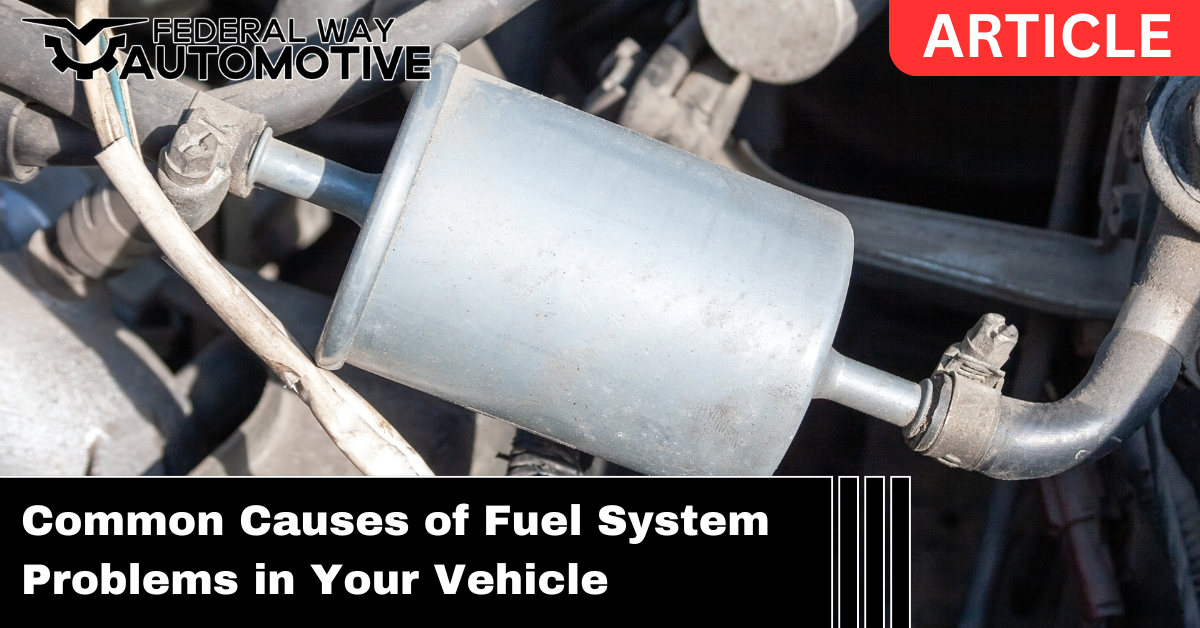Your car’s fuel system is the lifeline that keeps your engine running smoothly. Every time you start your vehicle, fuel must be pumped from the gas tank, filtered for impurities, and delivered at the right pressure and spray pattern to the engine’s combustion chambers. When the fuel system is clean and working properly, you get reliable starts, strong acceleration, and good fuel economy. When it isn’t, your car may stall, lose power, or even leave you stranded.
At Federal Way Automotive, we’ve seen firsthand how often drivers in the Pacific Northwest experience fuel-related issues. Many of these problems can be avoided with proper maintenance and timely repairs. In this guide, we’ll explain the most common causes of fuel system problems, the warning signs to look out for, and what you can do to protect your vehicle from unnecessary breakdowns.
Why the Fuel System Matters
Before diving into the causes, it helps to understand why the fuel system is so critical. Modern vehicles rely on precision fuel delivery — even the smallest disruption can throw off your engine’s balance of air and fuel. This balance directly impacts performance, emissions, and fuel efficiency.
When the system is compromised, you may notice symptoms like poor acceleration, misfires, or difficulty starting. Left untreated, these small issues can spiral into expensive repairs such as engine damage or fuel pump failure. Knowing the common causes can help you stay ahead of trouble.
1. Bad Gas or Contaminated Fuel
Not every gas station delivers the same quality fuel. Contaminated gas can enter your tank when a station’s underground tanks are poorly maintained or when water seeps in during rainy weather. It can also happen if you accidentally purchase the wrong type of fuel.
How it affects your car:
- Contaminants clog injectors and restrict flow.
- Water in fuel causes sputtering, stalling, and corrosion.
- Poor-quality additives can leave sticky deposits in your system.
Symptoms to watch for:
- Rough idling or hesitation when accelerating.
- Engine stalling shortly after starting.
- A sudden drop in miles per gallon.
- Check Engine light triggered by misfires.
Solution:
If you suspect bad gas, avoid driving as much as possible and bring your vehicle to a trusted shop like Federal Way Automotive. Technicians can test the fuel, drain the tank if necessary, and clean the system before damage spreads.
Prevention tip: Stick to well-known fuel brands and avoid filling up when a station’s tanks are being refilled — this process stirs up sediment that can end up in your vehicle.
2. Clogged Fuel Filters
Your fuel filter is the first line of defense against debris. Over time, however, the filter itself can become blocked. When that happens, fuel has trouble reaching the injectors at the correct pressure, causing your engine to struggle.
How it affects your car:
- Starves the engine of fuel, especially at higher speeds.
- Causes wear on the fuel pump as it works harder to push through.
- Increases the risk of misfires and lean running conditions.
Symptoms to watch for:
- Difficulty starting the engine.
- Loss of power when climbing hills.
- Jerking or hesitation during acceleration.
- Engine shuts off unexpectedly while driving.
Solution:
Replacing a clogged fuel filter is relatively inexpensive and can restore normal performance almost instantly. It’s one of the simplest and most cost-effective maintenance steps you can take.
Prevention tip: Follow your manufacturer’s recommended replacement schedule, which is often every 20,000–40,000 miles. In regions with older gas stations or varying fuel quality, replacing filters more often may be wise.
3. Dirty Gas Tank
Most drivers never think about their gas tank, but over the years, sediment, rust, and contaminants can build up inside it. When stirred up — such as when running low on fuel — these particles can enter the fuel system.
How it affects your car:
- Leads to frequent filter clogs.
- Damages fuel pumps and injectors.
- Reduces fuel pressure and disrupts combustion.
Symptoms to watch for:
- Repeated clogging issues even after filter replacement.
- Noisy or failing fuel pump.
- Decreased engine performance.
Solution:
Cleaning a dirty gas tank is more involved than replacing a filter, but it can restore proper fuel delivery and extend the life of your fuel pump and injectors. This service is especially valuable for older vehicles or cars that have been sitting unused for long periods.
Prevention tip: Avoid letting your fuel tank run down to empty — keeping at least a quarter tank helps prevent debris from being drawn into the system.
4. Failing Fuel Pump
The fuel pump does the heavy lifting by moving fuel from the tank to the engine. Pumps naturally wear out with age and can fail prematurely if forced to work harder than normal. Running your car on low fuel repeatedly is one of the most common causes of pump wear.
How it affects your car:
- Insufficient fuel pressure results in misfires and poor performance.
- Complete pump failure can cause your car not to start at all.
- A failing pump can overheat, damaging surrounding components.
Symptoms to watch for:
- Whining noise coming from the tank.
- Engine sputtering at highway speeds.
- Sudden stalls with no warning.
- Trouble starting or no start at all.
Solution:
Replacing a fuel pump is a bigger job, but catching the issue early can save you from being stranded. At Federal Way Automotive, our team can test fuel pressure to determine if the pump is at fault and recommend timely replacement if needed.
Prevention tip: Always keep at least a quarter tank of gas, and avoid driving with an empty tank. This reduces strain on the pump and helps it stay lubricated.
5. Clogged or Dirty Fuel Injectors
Fuel injectors deliver precise amounts of fuel at high pressure. Over time, carbon deposits and impurities can clog the injector nozzles, disrupting the spray pattern and causing uneven combustion.
How it affects your car:
- Poor spray patterns lead to rough running.
- Reduced fuel efficiency as the engine struggles to compensate.
- Long-term damage if the engine runs lean (too little fuel).
Symptoms to watch for:
- Rough idle or misfires.
- Hesitation when accelerating.
- Decreased miles per gallon.
- Difficulty starting the engine.
Solution:
Professional cleaning or replacement of dirty fuel injectors restores performance and efficiency. Specialized tools and solutions break down deposits that regular fuel additives can’t handle.
Prevention tip: Using high-quality fuel and scheduling periodic fuel system cleanings can help keep injectors clear.
Preventing Fuel System Problems
While some issues are unavoidable as a vehicle ages, many fuel system problems can be prevented with proper care. Here are steps every driver should take:
- Use top-tier fuel brands to reduce contaminants.
- Replace fuel filters on schedule.
- Keep your tank at least one-quarter full.
- Schedule professional cleanings every 30,000 miles or as recommended.
- Have your system inspected promptly if you notice symptoms like hesitation, sputtering, or poor fuel economy.
Preventive maintenance may seem small, but it protects your wallet in the long run by avoiding larger, more expensive repairs.
Trust Federal Way Automotive for Expert Fuel System Services
If you’re experiencing signs of fuel trouble — whether it’s bad gas, clogged fuel filters, a dirty gas tank, or a failing fuel pump — don’t ignore the warning signs. Waiting too long can lead to serious engine damage and much higher repair bills.
At Federal Way Automotive, we specialize in diagnosing and repairing fuel system problems for all makes and models. Our ASE-certified technicians use advanced diagnostic tools to pinpoint issues quickly and provide reliable, cost-effective solutions. We’re proud to serve our community with honest advice, skilled repairs, and a commitment to keeping you safe on the road.
Call us today or schedule an appointment online to restore your vehicle’s fuel system performance and ensure dependable driving for miles to come.


